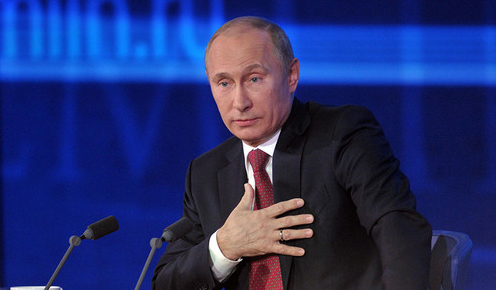Russian President Vladimir Putin has harshly criticized U.S. foreign policy over the last two decades as an “abuse of power” that has destabilized the Middle East and the entire international order.
Speaking at a question-and-answer session at the St. Petersburg International Economic Forum moderated by U.S. journalist Megyn Kelly, Putin accused the United States of conducting “crude and systematic interference in Russian affairs for years,” as well as promoting what he described as an antigovernment coup in Ukraine — a reference to pro-European protests that pushed Russia-friendly President Viktor Yanukovych from power in Kyiv in 2014.
He also said the United States was responsible for instability in Libya, Egypt, Iraq, and Syria, and that Western reports that the Syrian government carried out a chemical-weapons attack in April were a “provocation” aimed at discrediting Syrian President Bashar al-Assad. U.S. and other Western officials have rejected Russian assertions that the attack could have been staged.
As for Ukraine, Putin said the West “essentially started this thing” and called on Western countries to “do at least something to put an end to this problem.”
“It is not enough to point a finger at Russia all the time,” he added.
After Yankovych fled to Russia, Russia seized Ukraine’s Crimean Peninsula and fomented separatism in eastern Ukraine, where the ensuing war between Russia-backed separatists and Kyiv’s forces has killed more than 9,900 people and persists despite a cease-fire and peace deal.
Putin also dismissed NATO as merely an instrument of U.S. foreign policy, adding that Russia would respond to what it sees as NATO efforts to advance its “military infrastructure” to Russia’s borders. NATO says recent moves to bolster defenses in the east are an effort to respond to aggressive Russian moves and reassure allies concerned about Russia’s intentions that they will be protected.
At the same time, Putin said Russia was ready to cooperate with NATO in combatting international terrorism.
Putin denied any wrongdoing on Russia’s part regarding its ambassador’s contacts with the transition team of U.S. President Donald Trump before his inauguration in January. Putin said he personally had no knowledge of any conversations between Russian Ambassador Sergei Kislyak and Trump surrogates, but added that it is an ambassador’s job to meet with people and improve relations.
The FBI and the U.S. Congress are investigating the contacts between Russians and the Trump campaign and transition team. According to U.S. media reports, the FBI is looking at alleged efforts by Jared Kushner, Trump’s son-in-law who is now a top administration adviser, to open a “back channel” of communications with Russia.
Putin denied that Russia had reached any agreements with Trump’s team. He said the accusations were symptoms of political “hysteria” in the United States and urged the country to “take a pill.” He also dismissed the entire episode as “catastrophic nonsense.”
Putin also rejected U.S. allegations that Russia interfered in the 2016 U.S. presidential election, asserting — as has Trump — that the charges were an attempt by U.S. Democrats to blame others for their political shortcomings.
He said that what he called efforts to resolve U.S. domestic political conflicts on the international stage were “destructive.”
In January, the U.S. intelligence community issued an assessment that “Putin ordered an influence campaign in 2016 aimed at the U.S. presidential election” and that “Russia’s goals were to undermine public faith in the U.S. democratic system…[and] to help President-elect Trump’s election chances.”
Putin said he had read the U.S. assessment and that it contained “only speculations.”
Speaking earlier in the day at a separate panel at the economic forum, Putin urged U.S. business representatives to work with Trump’s administration to improve relations between the two countries.
Putin urged business leader present to “help us restore a normal political dialogue.”
In recent months, relations have hit what officials on both sides say is a low point over issues including Russia’s interference in Ukraine, disagreements over the conflict in Syria, and the allegations of interference in the U.S. election.



















































